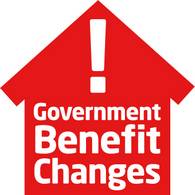Benefit changes after April 2013
 After the 5th of April 2013 there will be several changes, with more to follow later.
After the 5th of April 2013 there will be several changes, with more to follow later.
The ‘bedroom tax’ only applies to council and housing association homes, so not generally relevant to our clients. Already, if you privately rent, you are only eligible for any housing benefit based on the size of your family and your working income.
If you or your partner earn more than £50,000 a year, child benefit will be reduced, until £60,000 where it will be lost entirely. There are ways around this, although it might not apply to many or our clients in any case – please speak to an advisor immediately if this impacts you.
The benefit cap of £500 per week only applies to non-working families, so should not be relevant either.
Anyone receiving housing benefit should already have received a letter from their council advising of changes in council tax. After April 2013 the government will reduce funding to councils for council tax credit, and the difference may be expected to be paid by you. For example, if your council tax benefit was £80, it might now only be £60, for example – but all councils will be different, and charge differing amounts. Even within London, some local authorities will get more help from the government than others, and some will pass on more help to people than others.
Many people from Eastern Europe are concerned if working benefit payments will be stopped. At the moment at least, the answer is no. We suspect working benefits will stay for all EU migrants, London in particular cannot survive the way it is without them. We all know that there are changes every year in the UK tax and benefit system, but not all are immediate. For instance, Universal credit will be phased in over many years, and only after being tested first in a couple of non-London areas of the UK, being tested for mistakes and problem areas for at least 6 months.
Clients are asking if they can apply for Universal credit in advance. The answer is no, and it is at yet unclear when they will be transferred from the current system to the new one as Universal credit will be phased in over many years. The child tax credit element will only be lost under the same circumstances as it is now, i.e. if the child leaves full time education at 16, or if the child leaves the country for a long time, or indefinitely, or if you stop working, or your income is too high to qualify.
You do not need to apply online, or go to tax office to check this. Tax office will notify you about changes when necessary, and bare in mind, this might still be several years from now. Universal credit will eventually replace, tax credit, child tax credit, job seekers allowance, income support, and housing benefit.
We hear a lot about the ‘immigration situation’, and many Bulgarians and Romanians when they hear the word immigrant, they are starting to associate this now negative term with themselves. But most of the benefits for this group are working benefits, based on a working income, which is why we believe talk of cracking down on benefits, will have very little impact all the time rules on benefits apply to both UK nationals and other EU nationals. The issue seems to be based around political gain and not government cost savings. Other immigrants from outside the EU can claim job seekers allowance for example, something for which Bulgarians and Romanians cannot apply for at this time. At this time, Bulgarians and Romanians can generally only work on a self-employed basis, that is why you pay NI class 2, not class 1 (which might make you entitled for Job Seekers Allowance).
We advise all clients to register with the Home Office for yellow and blue card because the government looks like they might be thinking about introducing new rules for all EU immigrants. After 1st April 2013 all registration with the Home Office will have to be paid for. The cards show that you are resident and working within the UK, and what you are entitled to do in terms of work.
For more information about changes detailed above, please contact the team at Good Start Consultancy.
